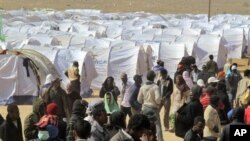The crisis in Libya could put food security at risk, not only in Libya, but in neighboring countries as well.
Daniele Donati, chief of the Emergency Operations Service for the U.N. Food and Agriculture Organization, says, “They employ a lot of workers from neighboring countries. And these people, they are now fleeing the country and they are back in their own countries of origin, mainly Egypt, Tunisia, to some extent also Niger and Algeria.”
Donati says it’s important to remember that the regional political turmoil now underway is due in part to what he calls “soaring food prices.”
He warns, “This kind of social instability is not completely over. And it’s normally considered a symptom of a sort of a malaise, to use a French word. Something like social fever, if you see what I mean.”
Migrant workers
Migrant workers in Libya have played a large role in the country’s food production.
“The largest proportion of the agricultural workers in Libya [were] all from Egypt. Traditionally, the Libyan people, rural people, are pastoralists, rather than agriculturalists. They are more concentrated on livestock than crops. So the field workers are all from the neighbor countries and they left in large part,” he says.
The FAO is unable to make a full assessment of the situation in Libya because it lacks access to all parts of the country.
Donati says, “We need to assess a number of key variables. But the presence of these…agricultural workers is extremely important to assess the capacity of the country to produce that part of the food budget that’s normally domestically produced.”
Imports
The U.N. agency says the region heavily depends on cereal imports.
“The different coastal countries in the Maghreb affected by this crisis, namely Libya, Egypt and Tunisia, they’re all characterized by a very heavy dependency [on] food imports, which doesn’t mean that agriculture is not important in their country. It means agriculture in these countries is limited in terms of volume, but it’s key and strategic to feed people,” he says.
Donati estimates Libya’s dependence on imports to be as high as 80 percent.
“They import inflation. If you have high food prices on international markets and your agricultural sector requires an integration of 80 percent to cover the consumption needs in the country, you systematically import inflation, increasing prices. The price of maize on the international markets in the recent months has increased between 75 and 85 percent,” he says.
He adds that people, who depend on maize flour, have a “serious problem.”
The FAO says it plans to distribute vegetable seeds along with food aid in Libya in areas around cities and coasts. The goal is to “boost consumption of fresh food and micronutrient intake.”










